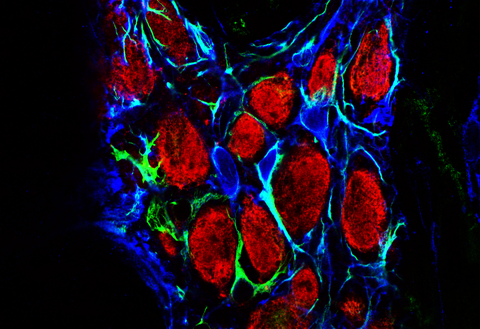Research
Digital Systems Medicine and Organ Crosstalk
Many human diseases result from complex interactions between different organs and cellular systems, which traditional organ-focused models often fail to fully capture. Our interdisciplinary and international team of researchers is dedicated to developing innovative therapies for gastrointestinal (GI) diseases by decoding the molecular circuits involved in organ crosstalk.
We focus on the gut-liver axis in liver diseases, including non-alcoholic fatty liver, acute liver failure, and cholestatic liver diseases. In addition, we study how neuro-immune communication within the GI tract controls complex processes such as inflammation and carcinogenesis. By leveraging state-of-the-art imaging and advanced multi-omics technologies, we dissect the complex crosstalk between different cellular systems.

Z-projection of a confocal whole mount of the myenteric plexus within the enteric nervous system. Enteric neurons are shown in red and glia cells in green.
From Basic Research to Clinical Translation
Our research includes work in animal models as well as clinical applications enabling us to translate our findings from bench to bedside. We apply a wide range of technologies in our research, including flow cytometry, single-cell RNA sequencing, shotgun metagenomic sequencing, metabolomic analyses, and analyses from large patient cohorts such as the UK Biobank, and Penn Medicine Biobank). Additionally, artificial intelligence plays a key role in our research efforts.
By studying GI diseases from the perspective of organ and cellular crosstalk, we aim to identify novel principles of disease mechanisms and therapeutic targets. Our team’s diverse expertise, ranging from molecular biology and immunology to bioinformatics, data science, and clinical medicine, fosters a dynamic environment for scientific exchange. This allows us to address research questions from different angles and to develop innovative solutions.
